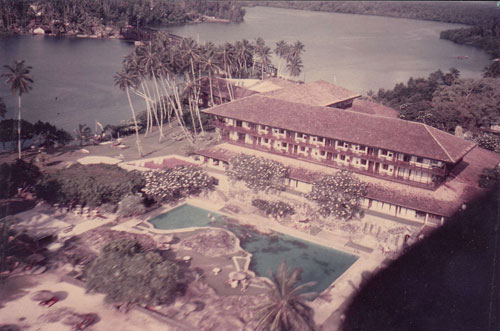JKH concerned over uncertainties in tax and reforms
View(s):
A 1970s picture of Bentota Beach.
John Keells Holdings, considered to be Sri Lanka’s largest conglomerate, has expressed concern over an issue which has been been one of the reasons why foreign investors are not coming in droves: inconsistent policies.
Group Chairman Susantha Ratnayake alluded to this in the group’s annual 2016/17 financial year ending March 31 report released this week
“Despite the policy uncertainty which prevailed during the period with regard to taxation and other reforms, I am pleased to state that your group remained agile and adapted to the changing conditions, with the administration and operating expenses increasing by less than market norms despite the increased activity and the resultant 13 per cent growth in revenue (at Rs.106 billion),” he said in the customary chairman’s report in the annual accounts..
The report said group profit before tax increased by 19 per cent to Rs.22.89 billion while post tax profit was up at Rs.18.1 billion against Rs.15.8 billion in the previous year. Total assets value was Rs.277 billion versus Rs.241 billion earlier.
The market price of per share as at March 31, 2017 fell to Rs. 137.90 against Rs.148 at the same time last year.
Transportation sector’s post-tax profit was Rs.2.98 billion with a significant increase in profitability coming from the ports, shipping and bunkering businesses.
“Since the expansion of capacity with the commissioning of the South Container Terminal, the overall capacity utilisation of the Port of Colombo is now in excess of 70 per cent, demonstrating the strong potential for capacity led growth. In this context, timely development of the deep-draft East Container Terminal (ECT) is critical to ensure that capacity continues to be enhanced towards attracting further volumes and sustain continued growth at the Port. Subsequent to the Expression of Interest submitted in September 2016 in this regard, the group will look to leverage on this investment opportunity considering the overall prospects for the Port of Colombo,” the report said.
The leisure sector reported a post-tax profit of Rs.5 billion.
On the retail sector, the report said, “The penetration of modern Fast Moving Consumer Goods (FMCG) retail in the country is still low, compared to more developed regional countries, and this presents a significant opportunity for growth. With a number of new locations having been already identified, the sector will continue to strategically expand its store network and distribution capabilities in gaining market share”.
On property, the report said the group recognises the fact that revenue recognition in this sector has shown volatility in the past years due to the lack of a robust pipeline of projects. “Given the opportunities arising from landmark infrastructure projects such as Port City Colombo and the Western Region Megapolis Planning Project, the Group will seek to establish a continuum of projects, in both commercial and residential spaces. In this light, land parcels in the city and the suburbs have been identified and negotiations and due diligence exercises are currently under way. More specifically, the group has entered into a MoU with a partner in relation to one such prospective property development project in central Colombo. Subject to the finalisation of the concept, cost parameters and other approvals, the project is expected to be launched in early 2018”.
| Old Bentota Beach gets a makeover | |
| Bentota Beach by Cinnamon, probably the oldest hotel on Sri Lanka’s southern coastline, is to be stripped bare, except for a small part, to make way for a new, 151 room upmarket resort at a cost of Rs. 4 billion, officials said. “Except for a small part which has the original architecture (the reception area) of renowned Sri Lankan architect Geoffrey Bawa, the two wings will be brought down with new buildings coming up,” said Krishan Balendra, President Leisure Sector at John Keells Holdings (JKH), owner of the largest chain of hotels in Sri Lanka. The near 50-year old Bentota Beach, built in 1969 as a 133-room hotel, is one of the first hotels to come up in the country’s first organised tourism zone in 1969 at Bentota on the southern coast. Structural engineers had advised against renovating the building and a decision was made to build a new hotel with similar architecture. The hotel will be closed for two years from July 1, 2017 onwards. Renovations at Bentota Beach is in the hands of celebrated architect Channa Daswatte, a prodigy of Bawa. |


